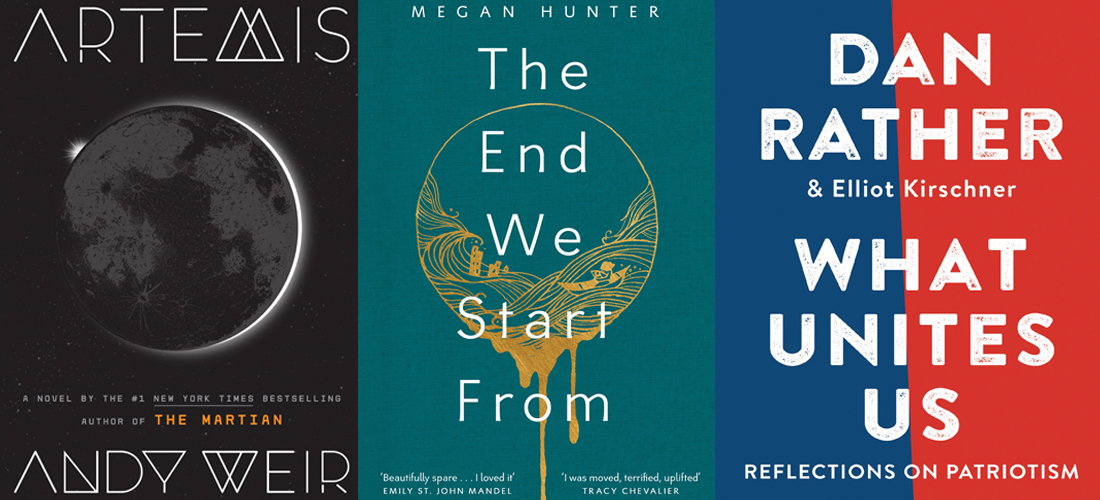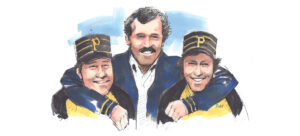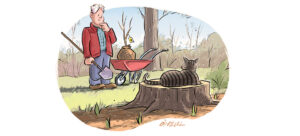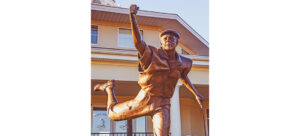
FICTION
Heather, the Totality, by Matthew Weiner
The explosive debut novel — about family, power and privilege — from the creator of the award-winning Mad Men. Mark and Karen Breakstone have constructed the idyllic life of wealth and status they always wanted, made complete by their beautiful and extraordinary daughter Heather. But they are still not quite at the top. When the new owners of the penthouse above them begin construction, an unstable stranger penetrates the security of their comfortable lives and threatens to destroy everything they’ve created.
Future Home of the Living God, by Louise Erdrich
The New York Times best-selling, National Book Award-winning author of LaRose and The Round House paints a startling portrait of a young woman fighting for her life and her unborn child against oppressive forces that manifest in the wake of a cataclysmic event. The world as we know it is ending. Evolution has reversed itself, affecting every living creature on Earth. Science cannot stop the world from running backward, as woman after woman gives birth to infants that appear to be a primitive species of humans. Cedar Hawk Songmaker, the 32-year-old adopted daughter of a pair of big-hearted, open-minded Minneapolis liberals, is as disturbed and uncertain as the rest of America. But for Cedar, this change is profound and deeply personal. She is four months pregnant. A chilling dystopian novel both provocative and prescient, Future Home of the Living God is a startlingly original work from one of our most acclaimed writers: a moving meditation on female agency, self-determination, biology and natural rights that speaks to the troubling changes of our time.
The End We Start From, by Megan Hunter
A searingly original debut, The End We Start From heralds the arrival of Megan Hunter, a dazzling and unique literary talent. As London is submerged below floodwaters, a woman gives birth to her first child, Z. Days later, she and her baby are forced to leave their home in search of safety. They head north through a newly dangerous country seeking refuge. The story traces fear and wonder as the baby grows, thriving and content against all the odds. A modern-day parable of rebirth and renewal, of maternal bonds, and the instinct to survive in the absence of all that’s familiar, The End We Start From is an indelible and elemental first book.
The Story of Arthur Truluv, by Elizabeth Berg
For the past six months, Arthur Moses’ days have looked the same: He tends to his rose garden and to Gordon, his cat, then rides the bus to the cemetery to visit his beloved late wife for lunch. The last thing Arthur would imagine is for one unlikely encounter to utterly transform his life. Maddy Harris is an 18-year-old introspective girl who visits the cemetery to escape the other kids at school. One afternoon she joins Arthur — a gesture that begins a surprising friendship between two lonely souls. Moved by Arthur’s kindness and devotion, Maddy gives him the nickname “Truluv.” As Arthur’s neighbor Lucille moves into their orbit, the unlikely trio band together and, through heartache and hardship, help one another rediscover their own potential to start anew.
Artemis, by Andy Weir
The best-selling author of The Martian returns with an irresistible new science fiction thriller — a heist story set on the moon. Jazz Bashara is a criminal. Well, sort of. Life in Artemis, the first and only city on the moon, is tough if you’re not a rich tourist or an eccentric billionaire. So smuggling in the occasional harmless bit of contraband barely counts, right? Not when you’ve got debts to pay and your job as a porter barely covers the rent. Everything changes when Jazz sees the chance to commit the perfect crime, with a reward too lucrative to turn down. But pulling off the impossible is just the start of Jazz’s problems, when she learns she’s stepped squarely into a conspiracy for control of Artemis itself. Her only chance at survival lies in a gambit even more unlikely than the first.
Strangers in Budapest, by Jessica Keener
Budapest is a city of secrets, a place where everything is opaque and nothing is as it seems. It is to this enigmatic city that a young American couple, Annie and Will, move with their infant son, shortly after the fall of the Communist regime. Annie hopes to escape the ghosts from her past; Will wants to take his chances as an entrepreneur in Hungary’s newly developing economy. But only a few months after moving there, they receive a secretive request from friends in the U.S. to check up on an elderly stranger who also has recently arrived in Budapest. When they realize that his sole purpose for coming there is to exact revenge on a man who he is convinced seduced and then murdered his daughter, Will insists they have nothing to do with him. Annie, unable to resist anyone she feels may need her help, soon finds herself enmeshed in the old man’s plan, caught up in a scheme that will end with death. Atmospheric, secretive, much like the old Hungarian city itself, Strangers in Budapest is an intricately woven story of lives that intersect and pull apart, perfect for fans of Celeste Ng’s Everything I Never Told You and Chris Pavone’s The Expats. Keener has written a transporting novel about a couple trying to make a new life in a foreign land, only to find themselves drawn into a cultural, and generational, vendetta.
NONFICTION
The Written World: The Power of Stories to Shape People, History, Civilization, by Martin Puchner
On this remarkable journey, the power of literature to shape people, civilizations and world history is explored through 16 key stories from over 4,000 years of literature — from the Iliad and its influence on Alexander the Great to J.K. Rowling’s impact today. In this delightful and important book, Martin Puchner tells stories of people whose lives and beliefs led them to create groundbreaking texts that affected the world they we were born into, and the world in which we live today. Puchner offers a worldwide perspective, beginning with the Epic of Gilgamesh, through the Book of Ezra, The Tale of Genji, Cervantes’ Don Quixote, up to the present. Fascinating facts and insights about people (Gutenberg, Ben Franklin, Goethe) and inventions (writing technologies, the printing press, the book) and how they shaped religion, politics and commerce are also explored. Puchner brings literature alive and changes the way we view the power of great stories, past, present, and future, as he tells the story of literature in 16 acts.
What Unites Us: Reflections of Patriotism, by Dan Rather
At a moment of crisis over our national identity, Dan Rather has been reflecting — and writing passionately almost every day on social media — about the world we live in, what our core ideals have been and should be, and what it means to be an American. Now, in a collection of original essays, the venerated television journalist celebrates our shared values and what matters most in our great country, and shows us what patriotism looks like. Writing about the institutions that sustain us and the values that have transformed us, Rather brings to bear his decades of experience on the frontlines of the world’s biggest stories. After a career spent as a reporter and anchor for CBS News, where he interviewed every living president since Eisenhower and was on the ground for every major event, from the assassination of John F. Kennedy to Watergate to 9/11, Rather has in the last year become a hugely popular voice of reason on social media, with more than 2 million Facebook followers and an engaged new audience who help many of his posts go viral. With his famously plainspoken voice and a fundamental sense of hope, Rather has written the book to inspire conversation and to remind us how we are ultimately united.
God: A Human History, by Reza Aslan
The No. 1 New York Times best-selling author of Zealot explores humanity’s quest to make sense of the divine, and sounds a call to embrace a deeper, more expansive understanding of God. In Zealot, Aslan replaced the well-worn portrayal of Jesus of Nazareth with a startling new image of the man in all his contradictions. In his new book, Aslan takes on a subject even more immense, God, writ large. More than just a history of our understanding of God, this book is an attempt to get to the root of this humanizing impulse in order to develop a more peaceful, universal spirituality unencumbered by the urge to foist our human characteristics upon the divine. Whether you believe in one God or many gods or no god at all, God: A Human History will transform the way you think about the divine and its role in our everyday lives.
A World Without “Whom”: The Essential Guide to Language in the BuzzFeed Age, by Emmy J. Favilla
When it comes to language these days, there is no such thing as correct style. Favilla believes in a language that is playful, flexible and ethically aware. Communication is an art, not a science, and artistic license is especially crucial to the internet age, when language is evolving faster than ever before. Now considered the go-to expert, Favilla has written a profoundly funny, engaging, provocative book about how language evolves, a work as full of humor and charm as it is practical advice. With wry cleverness and an uncanny intuition for the possibilities of expressiveness, Favilla argues that rather than try to preserve the sanctity of the written language as laid out by Strunk and White, we should be concerned with the larger issues of clarity and accuracy, with preserving the natural patterns of speech, and with being politically sensitive and respectful. Her ideas will fascinate believers and naysayers alike, and her approach to the new rules will delight anyone who has ever considered the question of “whom” (phase it out!), the singular “their” (phase it in!) or whether to hyphenate sideboob (never!).
President McKinley: Architect of the American Century, by Robert W. Merry
Republican President William McKinley, assassinated in 1901, six months into his second term as president, transformed America into an imperial power. Although he does not register large in either public memory or historians’ rankings, in this revealing account, Merry unfolds the mystery of how this bland man managed such profound change. McKinley settled decades of monetary controversy by taking the country to a strict gold standard; in the Spanish-American War he kicked Spain out of the Caribbean and liberated Cuba; in the Pacific he acquired Hawaii and the Philippines through diplomacy and war; he developed the doctrine of “fair trade”; forced the “Open Door” to China; forged our “special relationship” with Great Britain. He expanded executive power and managed public opinion through his quiet manipulation of the press. McKinley paved the way for the bold and flamboyant leadership of his famous successor, Teddy Roosevelt, who built on his accomplishments (and got credit for many of them). Merry writes movingly about McKinley’s admirable personal life, from his simple Midwestern upbringing to his Civil War heroism to his brave comportment just moments before his death. Lively, definitive and eye-opening, President McKinley resurrects this overlooked figure and places him squarely on the list of our important presidents.
The Vanity Fair Diaries: 1983-1992, by Tina Brown
Summoned from London in hopes that she can save Condé Nast’s troubled new flagship Vanity Fair, Brown is immediately plunged into the maelstrom of the competitive New York media world and the backstabbing rivalries at the court of the planet’s slickest, most glamour-focused magazine company. She survives the politics, the intrigue and the attempts to derail her by a simple stratagem — succeeding. In the face of rampant skepticism, she triumphantly reinvents a failing magazine. Here are the inside stories of Vanity Fair scoops and covers that sold millions — the Reagan kiss, the meltdown of Princess Diana’s marriage to Prince Charles, the sensational Annie Leibovitz cover of a gloriously pregnant, naked Demi Moore. In the diary’s cinematic pages, the drama, the comedy and the struggle of running an “it” magazine come to life. The Vanity Fair Diaries is also a woman’s journey, of making a home in a new country and of the deep bonds Brown shares with her husband, their prematurely born son, and their daughter.
Kiss the Ground: How the Food You Eat Can Reverse Climate Change, Heal Your Body & Ultimately Save Our World, by Josh Tickell
Discover the hidden power soil has to reverse climate change, and how a regenerative farming diet not only delivers us better health and wellness, but also rebuilds our most precious resource — the very ground that feeds us. Josh Tickell, one of America’s most celebrated documentary filmmakers and director of Fuel, has dedicated most of his life to saving the environment. Now, in Kiss the Ground, he explains an incredible truth: by changing our diets to a soil-nourishing, regenerative agriculture diet, we can reverse global warming, harvest healthy, abundant food, and eliminate the poisonous substances that are harming our children, pets, bodies, and ultimately our planet. Through fascinating and accessible interviews with celebrity chefs, ranchers, farmers and top scientists, this remarkable book, soon to be a full-length documentary film narrated by Woody Harrelson, will teach you how to become an agent in humanity’s single most important and time sensitive mission. Reverse climate change and effectively save the world — all through the choices you make in how and what to eat.
CHILDREN’S BOOKS
William’s Winter Nap, by Linda Ashman
William is all tucked in bed and ready to fall asleep in his cozy cabin when there is a tap on the window. Outside stands a chilled chipmunk who says, “My toes are cold, my tail is too, OK if I come in with you?” The night brings a succession of forest critters, each larger and colder than the last. The result is a delightful forest full of animals joining William in his snuggly warm bed. What results for readers are giggly preschoolers asking to read this charming winter story again and again. (Ages 2-5).
Robinson, by Peter Sis
A young boy discovers the best adventures await when he chooses not to follow the crowd, but instead take the lead of his own dreams. Written and illustrated by the award-winning Sis, this lovely book will be on every child’s “read it one more time” list. (Ages 3-6).
Thelma the Unicorn, by Aaron Blabey
Fame, fortune, glitter, sparkles, a horn! Thelma wanted it all. But when her Unicorn wish comes true, will it be all she hoped? Silly fun with a gentle message about loving yourself, Thelma the Unicorn is a great giggle-inducing read aloud. (Ages 3-6).
Nevermoor: The Trials of Morrigan Crow, by Jessica Townsend
Unlucky Morrigan Crow’s birthday present was an unusual one . . . a black umbrella. Even more unusual, it was given not by a parent but by Jupiter North — a member of the Wunder Society and her sponsor. Fans of The Unwanteds, Savvy and the Mysterious Benedict Society will devour this fast-paced adventure in which hotels can grow and change, umbrellas are modes of transportation, and unlucky children can rise to the highest heights if only they are honest, determined, brave and talented enough to pass the Wunder Society Trials. (Ages 8-14).
YOUNG ADULT
Long Way Down, by Jason Reynolds
Wow. Just wow. In less than 300 pages, with a few simple (yet blindingly poignant) words on each page, and a story that spans only the brief time it takes an elevator to go from the sixth floor of Will Holloman’s apartment building to the ground floor, brilliant author Jason Reynolds has crafted a masterpiece that will absolutely blow readers away. Strikingly relevant, tragic yet beautiful, this brilliant novel in verse is a great choice for fans of both Angie Sage’s The Hate You Give and Kwame Alexander’s Crossover. (Ages 12 and up). PS
Compiled by Kimberly Daniels Taws and Angie Talley.





